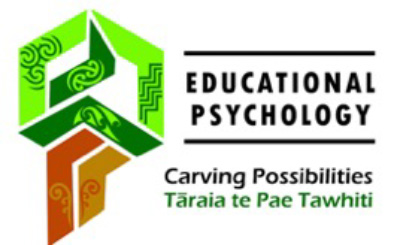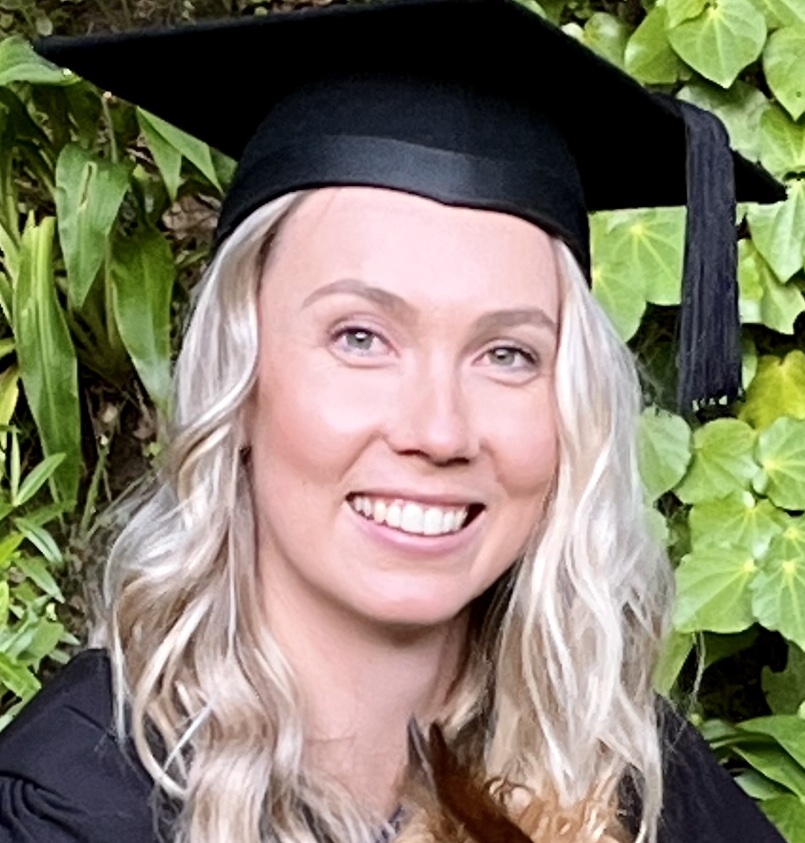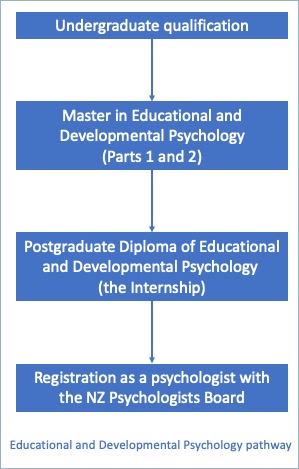Educational Psychology

This programme incorporates both the Masters of Educational and Developmental Psychology and the Internship (Postgraduate Diploma in Educational and Developmental Psychology).
There are specific undergraduate educational psychology and psychology courses that will prepare you for this.
Using contemporary bicultural practices you will develop expertise in assessment, learning theories, and psychological frameworks. Through indigenous and western lenses we have a strong bicultural programme to represent our context of Aotearoa New Zealand and our inclusive multicultural society.
This programme allows students to become critical thinkers underpinned by deep understanding of the intent of Te Tiriti o Waitangi and work as partners to apply te ao Māori world views and concepts. Ecological and cultural frameworks inform the kaupapa of the programme.
We emphasise the need to apply educational psychology critically to make a positive difference in our communities. There is a strong focus on ‘child voice’, learner identity, and young people’s rights to be involved in matters that affect them. The programme foregrounds a child’s rights focus and adheres to the United Nations Convention on the Rights of the Child (UNCROC).
What are our graduates saying?


What are the entry requirements?
 There are no specific entry requirements for our Bachelor of Arts (Educational Psychology) programme, outside of university admission regulations.
There are no specific entry requirements for our Bachelor of Arts (Educational Psychology) programme, outside of university admission regulations.
Before you can be admitted to the Master of Educational and Developmental Psychology (MEdDevPsych) programme you will have:
- been awarded or qualified for a bachelor’s degree in education, psychology, counselling, social work, speech language therapy, or a related relevant discipline, having achieved a grade average of at least a B in the highest-level courses (or equivalent).
- passed at least 60 credits of approved psychology courses including at least 45 credits at 200-level or higher. These courses could include social, health, educational, clinical, indigenous, neuro or developmental psychology, brain and behaviour or memory and cognition.
- completed at least 45 credits of Academic Board or delegate approved education courses including at least 30 credits at 200 level or higher.
- completed at least one year of full-time or equivalent part-time professional, learning or community learning experience in a relevant field.
More detailed information about this programme's entry requirements is available on its University's home page.
Admission to the Postgraduate Diploma in Educational and Developmental Psychology (PGDipEdDevPsych; the internship) is by selected entry only. To be eligible to apply for this internship, you will have a GPA of B+ or higher in your master’s qualification. Check out this programme's home page for more details.
What is the programme structure?
More detail is available from the Bachelor of Arts page on the University's website.
Bachelor of Arts (Educational Psychology)
Compulsory BA core courses
|
Course number and title * |
Description |
|---|---|
|
230110 Tūrangawaewae: Identity and Belonging |
This course examines formations of identity and belonging in relation to concepts of place and turangawaewae (‘standing place’). The multiple factors shaping identity formation, citizenship and public engagement will be explored, and students will develop awareness of and reflect on diverse perspectives regarding identity and citizenship, and apply this understanding to analyse issues in contemporary New Zealand society. |
|
230111 Tū Kupu: Writing and Inquiry |
This course introduces students to cultures of writing and inquiry in the Humanities and Social Sciences. It is designed to help students write effectively at undergraduate level by practising a variety of writing tasks, including analytical, persuasive, and research-based writing and argumentation. Students will learn practices of writing, research, peer-review and revision that have application in the university and broader contexts. |
|
230112 Tū Arohae: Critical Thinking |
This course develops students’ foundational analytical and critical thinking skills. It is designed to provide students in any discipline with the ability to describe, evaluate, and generate reasoning / arguments effectively, appropriately, and sympathetically, alongside an understanding of the hidden complexities inherent in this approach and its limits when employed as a form of persuasion. |
|
230210 Tū Rangaranga: Global Encounters |
The course explores our connections, impacts, and roles in the world, and our rights and responsibilities as global citizens. It examines what citizenship means in 21st century Aotearoa/NZ, given its history, cultural diversity, and place in the global arena. The course introduces the notion of global citizenship, and explores the relationship between individual and collective action in addressing global problems. |
|
230310 Tū Tira Mai: Practising Engagement |
The questions of and possibilities for agency and action form the core of this course, through an enquiry-based exploration of the capacities of the humanities and social sciences for action, intervention and contribution in professional and community contexts. The course also covers the development and application of research skills, problem-solving skills, and ethical awareness in addressing practical issues. |
Compulsory courses
|
Course number and title * |
Description |
|---|---|
|
175102 Psychology as a Natural Science |
An introduction to methods and findings from the scientific study of psychology and its application to everyday human behaviour. Examination of basic behavioural, perceptual and cognitive processes and how these are influenced by biological mechanisms and cultural context. |
|
256201 Educational Psychology |
An examination of the contribution of psychology to an understanding of educational processes with a focus on the learner, learning processes and instruction. Issues of theory, research and application will be studied in a variety of educational situations. |
|
256304 Positive Behaviour for Learning |
This course provides in depth exploration of the strategies and interventions for maintaining positive learning environments that support effective school engagement and achievement. |
|
263301 Learning and Motivation |
A study of contemporary theory and research on motivation in educational contexts with emphasis on implications for learning and for educational practice. |
|
263331 Assessment and Learning |
Assessment concepts and procedures for learning and teaching, the construction and use of educational assessments, and contemporary issues in evaluation. |
|
275102 Human Development |
An introduction to the study of lifespan human development and learning within changing social and physical contexts. |
Choose 15 credits from...
|
Course number and title * |
Description |
|---|---|
|
175201 Social Psychology |
A survey of contemporary experimental social psychology. Against this backdrop critical perspectives are introduced with particular emphasis on the practice of discursive psychology in the New Zealand context. |
|
175203 Introduction to Psychological Research |
An introduction to methods commonly used in psychological research with particular emphasis on measurement, study designs, data analysis, and communicating research results. |
|
175205 Brain and Behaviour |
An introduction to basic biological processes underpinning behaviour and what happens when these processes are disrupted. Students will develop critical thinking and effective communication skills (both verbal and written) in relation to biological psychology. |
|
175206 Memory and Cognition |
The central goal of the course is to consider how knowledge is represented and processed in the brain. Students will be introduced to the mental processes involved in thinking and knowing, studied within a converging methods framework that includes evidence from experimental psychology, neuroscience, neuropsychology, and cognitive science. |
|
175210 Ngā Tirohanga Rua o te Taha Hinengaro: Bicultural Perspectives in Psychology |
This course engages with the concept of culture, and its relevance and importance in a bicultural country such as Aotearoa. The interplay between non-Western cultural perspectives and the dominant form of psychology situated within a predominantly Western scientific paradigm, is explored. Indigenous perspectives in general and Māori worldviews specifically, are examined within and juxtaposed to, the discipline of psychology. |
Choose 15 credits from...
|
Course number and title * |
Description |
|---|---|
|
175306 Assessment of Individual Differences |
Study of the basic concepts of psychological testing within the broad context of the assessment of individual and group differences. Examination of the rationale behind testing and its application to a wide range of assessment situations. |
|
249384 Consultation and Collaboration in Inclusive Education |
An examination of methods and practices used in a consultative approach to assist learners with special needs in an inclusive educational environment. |
Other relevant entry courses for the MEdDevPsych programme
|
Course number and title * |
Description |
|---|---|
|
175301 Community Psychology |
Community psychology focuses on people within the contexts of social settings and systems, that is, in ecological relationships with social and physical environments. Conceptual frameworks, the roles of research and practice, and specific intervention strategies developed and used by community psychologists will be among topics considered. |
|
175302 Introduction to Clinical Psychology |
This course provides an introduction to clinical psychology and mental distress, with an emphasis on current thinking and research in the field. The course examines the core concepts in defining and classifying mental distress, some of the major psychological disorders across the lifespan, and empirically supported approaches to explaining mental illness, and treatments aimed at supporting people towards recovery. |
* All courses are each worth 15 credits
Master in Educational & Developmental Psychology (Part 1)
Compulsory courses
|
Course number & title * |
Description |
|---|---|
|
256701 Ako: Psychology of Learning and Teaching |
A study of learning and teaching processes within an ecological and developmental framework emphasising what learners bring to their learning and factors that support and hinder engagement. A focus on the use of psychological tools for learning/teaching (use of language, literacy and numeracy) allows in depth consideration of complex higher order processes and how they can be developed. |
|
256702 Ahurei: The Psychology of Unique Differences |
A study of how learners and teachers bring their diversity (defined by sociocultural, medical, developmental, and psychological frameworks) to their learning and teaching. A critical analysis of the way society and government systems defines and responds to diversity is central to this course, as is consideration of how contemporary inclusive education and positive psychology can better support learning for all. |
|
2267740 Mixed Methods Research in Education |
A study of mixed methods research design in education. Theoretical and practical issues of mixed methods research are studied under three course themes: context for research, mixed methods research designs, analysis and communication of mixed methods research. |
|
267741 Indigenous Research Methodologies |
A study of Māori research frameworks, philosophies and processes and an examination of their contribution to the growing body of indigenous scholarship as relevant to educational settings. |
Subject courses: select four courses from the following:
|
256703 He Taiao Ako: Psychology of Educational Settings |
A study of formal and informal educational settings, beginning with the teaching-learning relationship that is parenting, and moving through formal child and adolescent educational contexts into adult education. The psychological frameworks that help us understand the complexity of these settings and the interactions that occur within them are examined, along with how best to approach professional work in these settings. |
|
256704 Waiora: Psychology of Wellbeing and Ako |
A study of traditional and contemporary positive approaches to understanding and responding to mental health and wellbeing needs. A focus on the roles of schools in promotion and prevention is provided with reference to systemic, whole school, small group, and individual interventions. Evidence-based approaches to intervention are introduced, along with processes for risk-assessment in relation to mental health. |
|
256705 Whanaungatanga: Psychology of Relationships in Ako |
A study into space for relationships and relationship trust that underpin development and learning. The role of tikanga and psychological approaches that rely on relationships, such as interviewing, counselling, mediation, conflict resolution are explored, along with the multi-disciplinary situations that are inherent in educational and developmental psychology. |
|
256706 Whakapiki: Psychology of Change and Development |
A study of models and approaches that support the instigation and facilitation of change at the system, classroom, home, or individual levels. Contemporary practice in talking therapies, motivational interviewing, and brief therapy are explored and consideration is also given to specific issues such as disaster response, the impacts of trauma, principles of psychological recovery and the development of resilience. |
|
256707 Mānuka Tākoto - Behaviour Challenges |
A study of the challenges experienced by teachers, specialists, children and whānau when individual or group behaviours challenge the ability to learn, socialise, retain relationships and impact on culture and identity, and to provide the tools to pick up the challenge for all involved to address these. |
All courses listed are 15 credits
Master in Educational & Developmental Psychology (Part 2)
A GPA of B+ is needed over Part 1 in order to progress to Part 2 courses.
|
Course number & title * |
Description |
|---|---|
|
256847 Applied Research in Educational Psychology |
A supervised and guided research study presented in a research report. |
|
256854 Educational and Developmental Psychology Assessment |
Advanced study in contemporary assessment in educational and developmental psychology. |
|
256855 Educational and Developmental Psychology Practice |
Advanced study of professional practice in educational and developmental psychology. Principles, frameworks, competencies, attitudes and dispositions that underpin professional practice are critiqued and developed. Particular attention is given to bicultural issues, professional ethics, professional leadership, accountability and reflective practice. |
Postgraduate Diploma of Educational & Developmental Psychology (the Internship)
Compulsory courses
|
Course number & title * |
Description |
|---|---|
|
256841 Applied contemporary practice in educational psychology |
Casework involving early childhood, children and adolescents and their caregivers/teachers/whanau is undertaken during the year under supervision of registered psychologists. Analysis of the casework is presented to be assessed throughout the course. The folio of casework includes projects that centre on working with individuals, groups and systems. The casework undertaken will be decided according to the individual and professional development needs of the student. |
|
256843 Evidence-based practice in educational psychology |
Evidence-based practice and application to formal and informal learning contexts. Developing a professional practice portfolio with reference to the Core Competencies of the New Zealand Psychologists’ Board. |
|
256844 Competencies for Educational Psychologists |
Advanced study and supervised professional practice in educational and developmental psychology with a focus on competencies and critical professional reflection. |
|
256846 Professional Leadership in Educational Psychology |
Professional leadership and application of discipline knowledge, scholarship and research in supervised professional practice in educational and developmental psychology |
All courses listed are 30 credits
How long does it take to complete these programmes?
It takes three years full-time (360 credits) study to complete the BA (Educational Psychology) programme. You do, however, have the option to complete the programme part-time.
The MEdDevPsych programme takes two years full-time (240 credits). Part-time, you can take up to six years to complete.
The PGDipEdDevPsych Internship is completed in one year (120 credits) if studying full-time or up to two years part-time.
Where are these programmes available?
As well as at distance/online, you can study for the BA (Educational Psychology) at both our Albany (Auckland) and Manawatū (Palmerston North) campuses. Do note, however, that some compulsory courses in the programme are available by distance/online only. The undergraduate programme is open to international students studying online from outside of New Zealand.
Both the MEdDevPsych and PGDipEdDevPsych programmes are completed through blended learning options and require New Zealand based fieldwork.
Who should you contact?
How do you enrol?
To enrol:
- Login to the student portal and apply for admission to the programme and endorsement
- Select your courses (as above) for the qualification
A postgraduate qualification in Educational and Developmental Psychology is a good fit if you:
- are keen to use both indigenous and western knowledge foundations for assessment and learning
- want to use psychological theories and practices to support children’s social, cultural and educational development
- want to know how to work with a child’s right focus and effectively collaborate with other professionals.
 Professor Roseanna Bourke
Professor Roseanna Bourke